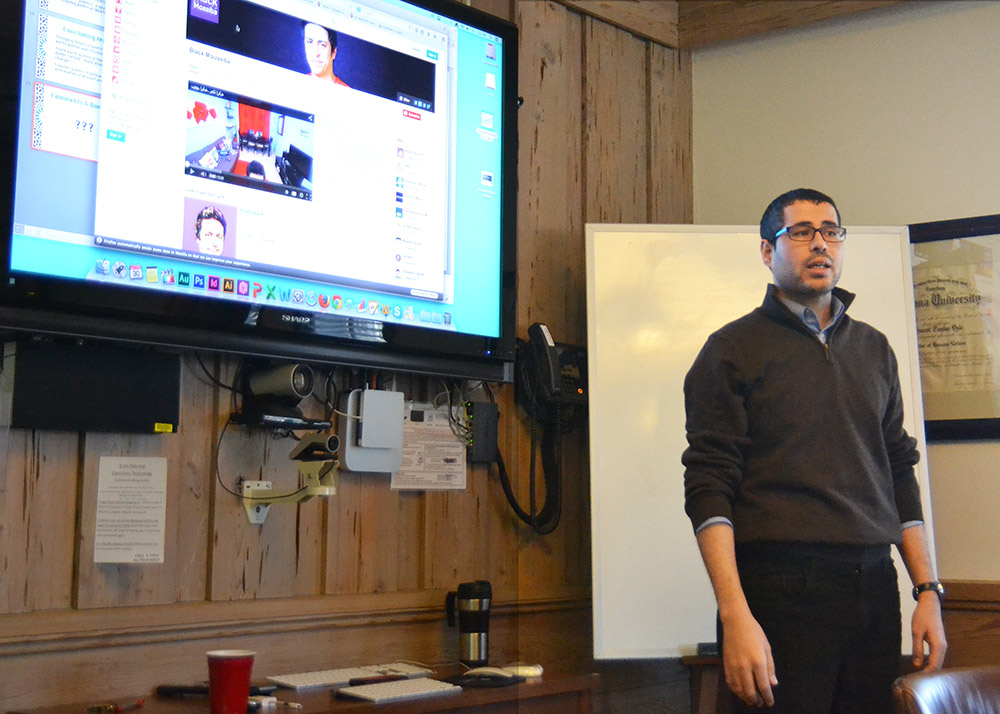Research Colloquium speakers address social media

— by Craig Lyons
Two IU Journalism doctoral students discussed their research Friday that looked at how people in Morocco and Muslims around the world are using online social media platforms.
Doctoral students Mohamed El Marzouki and Rosemary Pennington spoke during the journalism department’s first Research Colloquium of the semester. El Marzouki’s work looked at how young people in Morocco are using satirical YouTube videos for discourse, and Pennington’s work looked at how Muslim bloggers are using Tumblr to create an online community.
Professor Lars Willnat said it’s important that people are talking about Muslim issues at Indiana University.
“This is all very relevant research,” he said.
In Morocco, the popularity and content of satirical YouTube videos is beginning to show influence on the country’s leadership, El Marzouki found.
“This is, I think, a momentum for things to change bit by bit,” he said.
El Marzouki’s work, “Satire as Counter-discourse: Dissent, Cultural Citizenship and Youth Culture in Morocco,” explored how satirical YouTube videos have become a form of articulating cultural discourse in post-protest Morocco.
In Morocco, 30 percent of the population is between 15- 29 years old, according to El Marzouki, and 56 percent of the population uses the Internet.
In the wake of the Arab Spring movement, both the monarchy and the people opted to avoid a bloody push for change, El Marzouki said, and instead moved online to advocate for incremental change, which the government has responded to.
El Marzouki looked at two YouTube programs, “Black Moussiba” and “Skizofren,” to see what topics were being discussed and if there were patterns in the content. The most satirized issues can be grouped into cultural, political and social issues, El Marzouki said, but all were addressed in a political manner.
Additionally, El Marzouki noted how the issues discussed, whether transportation, jobs or crime, affected the younger segments of the population.
“They connect immediately to the every day life of youths,” he said.
Two viewpoints emerged: cultural and social conservatism and cosmopolitanism, according to El Marzouki, and the consequences are that people could rethink their role as citizens as less of an obligation but as participants, which would allow them to contribute to the production of culture in Morocco.
While El Marzouki looked at one piece of the Muslim world, Pennington took a more global approach, that of Muslim bloggers who write in English on the social media platform Tumblr.
Pennington’s work, “Muslim ‘Like Me’: Searching for Ummah in Tumblr,” involved a survey of 191 bloggers, following and reading 188 blogs and interviewing 23 of the writers. (“Ummah” means nation or community in Arabic.) Of those bloggers, she found that 89.2 percent were female; 86.2 percent were in non-Muslim countries; 76.6 percent were Sunni; 68.9 percent spend more than four hours on the Internet each day; 79.8 percent reblogged content daily; and 27.9 percent posted original content daily.
On the Tumblr posts, Pennington noticed a digital sectarian split between Sunni and Shia, and those who were born into Islam and those who reverted to the faith. Pennington said the reversion community has a strong presence, perhaps because they were unable to access a local community of Muslims and turned to the online world for support.
“It’s a community that’s extending into other spaces,” she said.
Despite many of the fractious conversations, Pennington said micro-communities of Muslims are developing.
There are moments when the whole community of bloggers unites, Pennington said, and one of those instances was last summer during deadly bombings in Gaza. She said people were looking for a place to collectively share feelings of grief and frustration about what happened, and that place was in the online world.
“This was a moment where all these bloggers were largely coming together,” she said, and a global ummah developed around Palestine.
Tumblr has created a place where bloggers have a feeling of being with and interacting with other people, Pennington said, and people who aren’t posting content are not part of that community.
The Research Colloquium series continues at 12:30 p.m. Feb. 6 in the Ernie Pyle Hall lounge. Doctoral student Kyle A. Heatherly will talk on “Civil Discussions or Partisan Rants? Commenting Interactivity on Online News Websites” and professor of practice Joe Coleman will discuss “Reporting the Aging Global Workforce.”
More:

